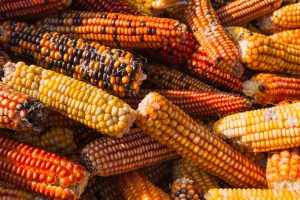By Lee Van Ham
How can we help the smaller farm farmers who resist Big Ag’s aggressive MultiEarth tactics?
What Big Ag Is —When the words Big Ag are used it denotes only six companies — Monsanto, Syngenta, Bayer, BASF, DuPont, and Dow Chemical — and their destructive MultiEarth methods of food production. These six control 63% of the world’s commercial seeds and 75% of global agrochemicals. They also behave in colonial, imperial ways by attacking and displacing traditional cultures and farming methods. Many farmers who’d switched to Big Ag methods and experienced better yields have then switched back after a few years when they see yields drop. The bump in yield is short-lived and very costly as it increased the farmer’s overhead and deadened the soil. Traditional methods prove to be more sustainable and constant in yields and also maintain their culture.
World Trade Tactics of Big Ag —Big Ag aggressively attacks small farmers globally through trade agreements that favor large U.S. markets and Big Ag chemical-intensive methods. Too often local farmers are being undersold by the imported product that they have been growing for their livelihoods. In many cases, they lose their ability to support their families and have to leave their farm and life they’ve known well in search of employment in cities or as immigrants to another country.
Biotechnology as Big Ag Aggression —In recent years biotechnology has been another strategy for Big Ag to own farming and food markets. The six large corporations who own seeds and agrochemicals use biotechnology to modify genes in the seeds (GMO or genetically modified organisms). They then patent the seeds as theirs. Currently, up to 92% of U.S. corn is genetically engineered (GE), as are 94% of soybeans and 94% of cotton [1] (cottonseed oil is often used in food products).
Many benefits are claimed by those promoting GMOs: increased crop yields, reduced costs for food or drug production, reduced need for pesticides, enhanced nutrient composition, and food quality, resistance to pests and disease, greater food security, and medical benefits to the world’s growing population.
 Despite such claims, GMOs are met with heavy criticism. Currently, 26 countries including France, Germany, Italy, Mexico, Russia, China, and India (19 of which are in the European Union (EU)) have partially or fully banned GMOs.Mexican President Andres Manuel Lopez Obrador argues for Mexico’s ban on the biotechnology of GMO corn because the ban will support the country’s food sovereignty, promote biodiversity, and protect human health. For the past several years, Mexico’s government has sought to regulate biotechnology to protect native corn species. Over 50 varieties of maize are grown by Mexican farmers. Maize is part of Mexican mythology. They are corn people. Origin stories include corn and it is part of rituals and altars. But trade agreements treat it as only a commodity.
Despite such claims, GMOs are met with heavy criticism. Currently, 26 countries including France, Germany, Italy, Mexico, Russia, China, and India (19 of which are in the European Union (EU)) have partially or fully banned GMOs.Mexican President Andres Manuel Lopez Obrador argues for Mexico’s ban on the biotechnology of GMO corn because the ban will support the country’s food sovereignty, promote biodiversity, and protect human health. For the past several years, Mexico’s government has sought to regulate biotechnology to protect native corn species. Over 50 varieties of maize are grown by Mexican farmers. Maize is part of Mexican mythology. They are corn people. Origin stories include corn and it is part of rituals and altars. But trade agreements treat it as only a commodity.
Slow Food International argues again GM crops: Continued industry promises about the ability of GM crops to tackle the world’s growing social problems are a myth: They have reduced biodiversity, polluted landscapes, threatened the future of small-scale farming and reduced the food security of the world’s poorest people.
Environmental concerns include the risk of outcrossing, where genes from GMO foods pass into wild plants and to fields of organic crops. Also, when seeds are modified to kill certain pests, they kill other insects indiscriminately. These contribute to the loss of biodiversity.
Health risks posed by genetic engineering according to the Center for Food Safety include toxicity and the inherent instability of genetically engineered seeds. Foods from GM crops develop allergies in some, contribute to immunosuppression, and resistance to antibiotics.
There are also economic disadvantages.
(1) Farmers with GM crops lose some export markets because of the countries that ban GMO crops.
(2) Organic farmers can have their products contaminated when pollen from nearby GM fields drifts to their crops. They then lose their organic certification and the premium they earn for their organic crop.
(3) Adoption of GMOs into seed markets makes farmers dependent on corporations that control the price and supply of seeds.
In summary, buying organic and locally farmed food means that in addition to the food we buy, we buy-cot the control of Big Ag over our food supply and farming enterprise while standing with the farmers who dare to resist Big Ag as they scramble to find markets for their produce and products.
Photo by Eric Prouzet on Unsplash





